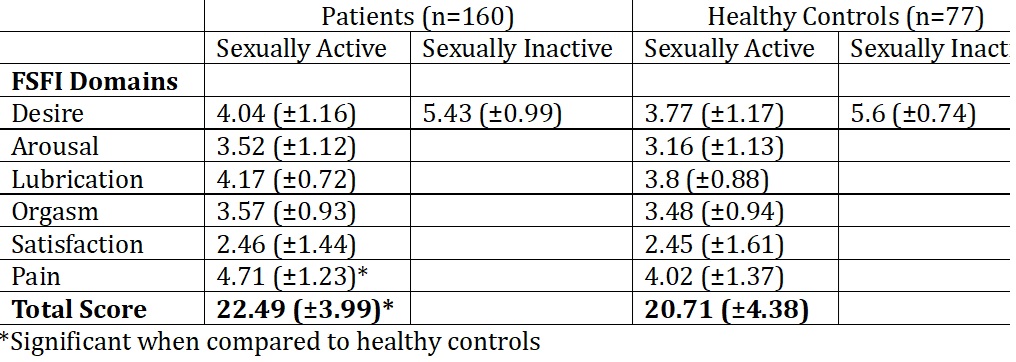Session Information
Date: Monday, October 27, 2025
Title: (1467–1516) Systemic Lupus Erythematosus – Diagnosis, Manifestations, & Outcomes Poster II
Session Type: Poster Session B
Session Time: 10:30AM-12:30PM
Background/Purpose: Systemic Lupus Erythematosus (SLE) disease activity can affect the normal functioning of the patients. This functioning in various domains can be assessed using quality of life (QoL) tools like Lupus QoL which is a disease specific QoL tool. Similarly, sexual function can be measured by tools like Female Sexual Function Index (FSFI) which is not an SLE specific instrument. We aimed to assess the impact of lupus disease activity on QoL and sexual function of female SLE patients from India.
Methods: We recruited 160 SLE (all females; Mean (±SD) age 28.75 (±8.07) years) patients satisfying ACR/EULAR 2019 classification criteria. A formal disease activity assessment was done using SLEDAI. Lupus QoL instrument in Hindi was used to assess the QoL. Briefly, a transformed domain wise score was calculated based on the responses in each of the 8 domains and a cumulative score for the instrument was calculated by adding the individual transformed domain scores and dividing it by the number of contributory domains. Sexual function in these ladies was assessed using the FSFI instrument (Hindi Version) and a domain wise score calculated in 6 domains. For FSFI, patients were divided into 2 groups based on having sexual intercourse within the last month: Sexually active (SA) and sexually inactive (SI). Age matched healthy ladies were recruited as healthy controls (HC) for comparison of FSFI scores in SA and SI groups. Continuous variables were expressed as Mean (±SD). Unpaired t-test was used to compare the scores and Spearman’s correlation coefficient was used to express correlation. A p-value< 0.05 was considered significant.
Results: Mean SLEDAI for all the patients was 4.88 (±3.22). Lupus QoL had worst scores in Fatigue domain and best in the physical health domain. (Table) In Lupus QoL, physical health, pain, planning, burden to others, emotional health, fatigue and the total QoL scores showed a modest negative correlation with SLEDAI. (Table 1)A total of 89 patients out of 160 (55.62%) and 35 (45.45%) ladies among the HC (n=77), reported having a sexual intercourse within the past 1 month. The scores in all domains of FSFI were compared for these. A total of 146 out of 160 patients (91%) and 75 out of 77 HC (97%) had an FSFI score < 26.55 putting them at risk for developing sexual dysfunction (p >0.05). For SI patients and HC, the scores only in the desire domain were compared which were not different. However, among the SA patients, scores in the pain domain and total FSFI scores were significantly better (p< 0.05 for both) as compared to HC. (Table 2) Neither any of the individual domains nor the total FSFI score correlated with SLEDAI.
Conclusion: The QoL in Indian SLE patients is the worst in the fatigue domain and best in the physical health domain. Except the intimate relationship and the body image scores in the QoL, all the scores and the total QoL score is adversely affected by disease activity. Sexual function in Indian female SLE patients is better than age matched HC even though 91% patients are at risk of developing sexual dysfunction. Absence of correlation of SLEDAI with the FSFI scores & intimate relationship domain of the QoL suggests that disease activity does not affect sexual function in these patients.
 Table 1. Domain wise and total scores for Lupus Quality of Life tool for lupus patients and their correlation with disease activity (SLEDAI)
Table 1. Domain wise and total scores for Lupus Quality of Life tool for lupus patients and their correlation with disease activity (SLEDAI)
.jpg) Table 2. Comparison of the domain wise and total Female Sexual Function Index mean (±SD) scores among patients and healthy females
Table 2. Comparison of the domain wise and total Female Sexual Function Index mean (±SD) scores among patients and healthy females
To cite this abstract in AMA style:
Gupta R, Singh N, Jawaliya N, Goswami R, Dhiman S, baisoya P. Lupus Disease Activity Adversely Affects the Quality of Life but not Intimate Relationship and Sexual Function in Indian Female Lupus Patients [abstract]. Arthritis Rheumatol. 2025; 77 (suppl 9). https://acrabstracts.org/abstract/lupus-disease-activity-adversely-affects-the-quality-of-life-but-not-intimate-relationship-and-sexual-function-in-indian-female-lupus-patients/. Accessed .« Back to ACR Convergence 2025
ACR Meeting Abstracts - https://acrabstracts.org/abstract/lupus-disease-activity-adversely-affects-the-quality-of-life-but-not-intimate-relationship-and-sexual-function-in-indian-female-lupus-patients/
